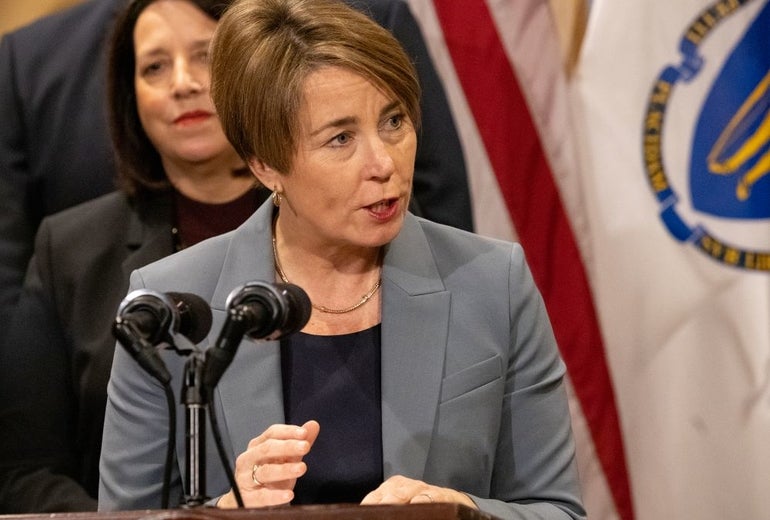The Healey Administration on Thursday rolled out its five-year capital spending plan, which calls for $14 billion in spending with a focus on investments in roads, housing, climate projects and economic development.
The plan also features $262 million towards “the federal government’s efforts” to replace the Bourne and Sagamore bridges to Cape Cod, ultimately ramping up to a $700 million long-term state commitment. Federal funds for the projects are still being pursued.
Healey’s $14 billion plan is slightly higher than the five-year plan former Gov. Charlie Baker presented last year, which laid out a blueprint for close to $13.9 billion in total state bond cap spending. Governors update and release the state’s capital spending plan each year.
Healey’s plan includes funding for a new courthouse to replace the outdated one in Springfield, $307 million to relocate the old Shattuck Hospital in Jamaica Plain to the East Newton Pavilion in Boston’s South End, and $421 million for information technology upgrades in fiscal 2024 alone, including electronic health records management at the Executive Office of Health and Human Services.
The plan commits $2.9 billion in total capital funding for the fiscal year that begins on July 1, with $1.14 billion committed to the state transportation department, $614 million to the Division of Capital Asset Management and Maintenance, and $308 million set aside for the new Executive Office of Housing and Livable Communities.
The capital plan allocates $1.5 billion over five years to housing initiatives, including $97 million to establish a HousingWorks program similar to the MassWorks grant program that has helped municipalities work with the state and developers on large projects.
The administration describes HousingWorks as a “flexible tool to support housing development, preservation, and rehabilitation, with the goal of enabling the construction of up to 300 new affordable housing units each year.”
The grant program builds on existing capital programs, such as the housing stabilization fund, which funds grants to developers for housing production and preservation projects that support residents with up to 60 percent of area median income, as well as transit-oriented housing and “climate resilient” affordable housing.
In addition to HousingWorks, the plan puts forward $43 million for the Affordable Housing Trust Fund and $14.9 million toward the Housing Innovations Fund, to “support ‘innovative and alternative’ forms of rental housing, including ‘homelessness’ housing, housing for seniors and veterans, and transitional units for recovery from substance abuse.'”
It dedicates $1.4 billion to transportation systems “to reduce emissions through electrification, create more sustainable modes of transportation, and build resilient infrastructure prepared to withstand the impacts of a changing climate.” Over five years, it funds 40 projects at state buildings with a focus on decarbonization and total project values at over $1.6 billion.
The plan dedicates $840 million over five years to modernize public higher education campuses to make them more climate resilient, and address critical repairs and deferred maintenance.
In fiscal 2024, capital investments include $164.8 million in federal funding from state matching funds to be used toward the Clean Water Trust. The trust offers loans and grants to cities, towns and water utilities to help communities build or replace water infrastructure to clean ground or surface water resources.
Other federal funding unlocked next year includes $30 million toward “Superfund sites” — abandoned hazardous waste sites.
The capital plan also seeks to leverage federal funding for the construction of new Chelsea and Holyoke Veterans’ Homes.
“The federal government provides up to 65 percent reimbursement for the two projects, with the Commonwealth contributing a 35 percent match, for a total five-year federal investment of $280.1 million,” a brief from Healey’s office says.
Economic development initiatives are funded with $1.2 billion in the plan, including about $80 million earmarked to solidify the state’s position in the innovation, life sciences, and advanced manufacturing industries.
Keen on keeping Massachusetts’ edge in the life sciences sector, Healey is dedicating $35 million to the Mass Life Science Center and $18.3 million in the Massachusetts Manufacturing Innovation Institute.
The Executive Office of Economic Development has earmarked $163.1 million “to strengthen Commonwealth communities,” in fiscal 2024, including through Community One Stop for Growth grants. This program is a single application portal for communities to apply for state funding. In fiscal 2023, the program connected funding for 337 local economic development projects in 169 communities, according to EOED.
This $163.1 million also includes $96 million toward the local infrastructure grant program MassWorks, and $16.6 million for towns and cities to revitalize underutilized properties.
The fiscal 2024 investments also continue funding for body worn camera grant programs for police officers, as well as other funding for equipment, vehicles and communications infrastructure for local law enforcement and first responders.
The plan includes $625 million of total funding for IT initiatives for health care systems, including $257 million for the Health Insurance Exchange Integrated Eligibility System, which manages the eligibility and enrollment of the roughly two million Massachusetts residents who receive health insurance through MassHealth and the Health Connector.
This funding comes at a time when the system is going through the challenging process of redetermining which residents are still eligible for state-funded health insurance after federal protections ended earlier this year. Of the $257 million going toward this initiative, $195 million is federal funding.

